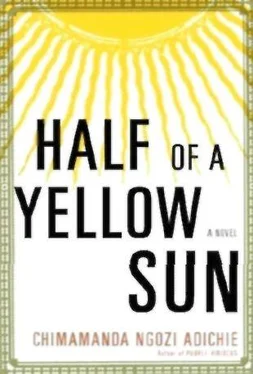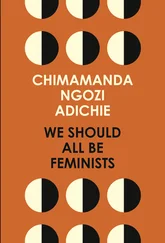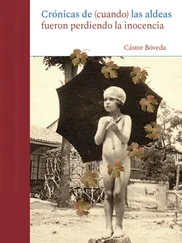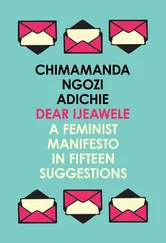Odenigbo did not answer, looking straight ahead.
"I asked you a question, Odenigbo."
"Mba, I didn't do anything with Alice." He glanced at her and then looked ahead at the road.
They said nothing else to each other until they arrived in Orlu, and Kainene and Harrison came out of the house. Harrison began to unpack the things in the car.
Kainene hugged Olanna, picked Baby up, and then turned to Odenigbo. "What an interesting beard," she said. "Are we trying to copy His Excellency?"
"I never try to copy anyone."
"Of course. I had forgotten how original you are."
Kainene's voice was thick with the tension that surrounded them all. Olanna could feel it, moisture-heavy hanging over the room when Richard came back and stiffly shook hands with Odenigbo and, later, when they sat at the table and ate the yam slices Harrison served on enamel plates.
"We're here until we can find a place to rent," Odenigbo said, looking at Kainene.
Kainene stared back at him, raised her eyebrows, and said, Harrison! Bring some more palm oil for Chiamaka."
Harrison came in and placed a bowl of oil before Baby. After he left, Kainene said, "He roasted a fantastic bush rat for us last week. But you would have thought it was a rack of lamb the way he went on about it."
Olanna laughed. Richard's laughter was tentative. Baby laughed too, as if she understood. And Odenigbo focused, unsmiling, on his plate. On the radio, there was a repeat broadcast of the Ahiara declaration, His Excellency's voice measured and determined.
Biafrawill not betray the black man. No matter the odds, we will fight with all our might until black men everywhere can point with pride to this Republic, standing dignified and defiant, an example of African nationalism…
Richard excused himself and came back with a bottle of brandy and gestured toward Odenigbo. "An American journalist gave it to me."
Odenigbo stared at the bottle.
"It's brandy," Richard said, holding it out, as if Odenigbo did not know. They had not spoken since Odenigbo drove to his house years ago to shout at him. They had not spoken even after they shook hands today.
Odenigbo did not reach out to take the bottle.
"You can have Biafran sherry instead," Kainene said. "Possibly more suitable for your tough revolutionary liver."
Odenigbo looked at her and there was a small, sneering smile on his face, as though he was both amused and annoyed by her. He stood up. "No brandy for me, thank you. I should get to bed. I have quite a walk ahead of me, now that Manpower has moved to the bush."
Olanna watched him go inside. She did not look at Richard.
"Bedtime, Baby," she said.
"No," Baby said, and pretended to focus on her empty plate.
"Come right now," Olanna said, and Baby got up.
In the room, Odenigbo was tying his wrapper around his waist. "I was just coming to put Baby to bed," he said. Olanna ignored him.
"Sleep well, Baby, ka chifo" he said.
"Good night, Daddy."
Olanna placed Baby down on the mattress, covered her with a wrapper, kissed her forehead, and felt the sudden urge to cry at the thought of Ugwu. He would have slept on a mat in the living room.
Odenigbo came and stood close to her and she wanted to back away, unsure what he was trying to do. He touched her collarbone. "Look how bony you are."
She glanced down, irritated by his touch, surprised to see how it jutted out; she did not know she had lost so much weight. She said nothing and went back to the living room. Richard was no longer there.
Kainene was still at the table. "So you and Odenigbo decided to look for a place?" she asked. "My humble home is not good enough?"
'Are you listening to him? We didn't decide anything. If he wants to find a place he can go ahead and live there alone," Olanna said.
Kainene looked at her. "What is the matter?"
Olanna shook her head.
Kainene dipped a finger in palm oil and brought it to her mouth. "Ejima m, what is the matter?" she asked again.
"Nothing, really. There is nothing I can point at," Olanna said, looking at the bottle of brandy on the table. "I want this war to end so that he can come back. He has become somebody else."
"We are all in this war, and it is up to us to decide to become somebody else or not," Kainene said.
"He just drinks and drinks cheap kai-kai. The few times they pay him, the money goes quickly. I think he slept with Alice, that Asaba woman in our yard. I can't stand him. I can't stand him close to me."
"Good," Kainene said.
"Good?"
"Yes, good. There's something very lazy about the way you have loved him blindly for so long without ever criticizing him. You've never even accepted that the man is ugly," Kainene said. There was a small smile on her face and then she was laughing, and Olanna could not help but laugh too, because it was not what she had wanted to hear and because hearing it had made her feel better.
In the morning, Kainene showed Olanna a small pear-shaped vial of face cream. "Look at this. Somebody went abroad and brought it for me. My face creams finished months ago and I've been using that horrible Biafran-made oil."
Olanna examined the pink jar. They took turns dabbing the cream on their faces, slowly, sensually, and afterward went down to the refugee camp. They went every morning. The new harmattan winds blew dust everywhere, and Baby joined the thin children who ran around with their naked bellies wreathed in brown. Many of the children collected pieces of shrapnel, played with them, traded them. When Baby came back with two bits of jagged metal, Olanna shouted at her and pulled her ear and took them away. She hated to think that Baby was playing with the cold leftovers of things that killed. But Kainene asked her to give them back to Baby. Kainene gave Baby a can to store the shrapnel. Kainene asked Baby to join the older children making lizard traps, to learn how to mat the palm fronds and place the cocoon full of iddo ants inside. Kainene let Baby hold the dagger of the emaciated man who paraded the compound, muttering, "Ngwa, let the vandals come, let them come now." Kainene let Baby eat a lizard leg.
"Chiamaka should see life as it is, ejima m," Kainene said, as they moisturized their faces. "You protect her too much from life."
"I just want to keep my child safe," Olanna said. She took a small dash of cream and began to rub it into her face with the tips of her fingers.
"They protected us too much," Kainene said.
"Daddy and Mom?" Olanna asked, although she knew.
"Yes." Kainene spread the cream on her face with her palms. "Good thing Mom left. Can you imagine her ever living without things like this? Or using palm-kernel oil?"
Olanna laughed. She wished, though, Kainene would not take so much of the cream, so that it would last as long as possible.
"Why were you always so keen to please Mom and Dad?" Kainene asked.
Olanna held her hands to her face, silent for a while. "I don't know. I think I felt sorry for them."
"You have always felt sorry for people who don't need you to feel sorry for them."
Olanna said nothing because she did not know what to say. It was the kind of thing she would have discussed with Odenigbo, Kainene's voicing for the first time a resentment with their parents and with her, but she and Odenigbo hardly talked. He had found a bar close by; only last week, the bar owner had come to the house asking for him because he had not paid his balance. Olanna said nothing to him after the bar owner left. She was no longer sure when he went to the Manpower Directorate and when he simply went to the bar. She refused to worry about him.
She worried about other things: how her periods were sparse and no longer red but a muddy brown, how Baby's hair was falling out, how hunger was stealing the memories of the children. She was determined that their minds be kept alert; they were Biafra 's future, after all. So every day she taught them under the flame tree, away from the horrible smells toward the back of the buildings. She would have them memorize one line of a poem, and the next day they would have forgotten it. They chased after lizards. They ate garri and water once a day now instead of twice because Kainene's suppliers could no longer cross over to Mbosi to buy garri; all the roads were occupied. Kainene launched a Plant Our Own Food movement, and when she joined the men and women and children in making ridges, Olanna wondered where she had learned to hold a hoe. But the soil was parched. The harmattan cracked lips and feet. Three children died in one day. Father Marcel said Mass without Holy Communion. The belly of a young girl named Urenwa began to grow and Kainene was not sure if it was kwashiorkor or pregnancy until the girl's mother slapped her and asked, "Who? Who did this to you? Where did you see the man that did this to you?" The doctor no longer visited because there was no petrol and there were too many dying soldiers to treat. The well dried up. Kainene went often to the Directorate at Ahiara to get a water tanker, but each time she came back with a vague promise from the director. The thick ugly odors of unwashed bodies and rotting flesh from the shallow graves behind the buildings grew stronger. Flies flew over the sores on children's bodies. Bedbugs and kwalikwata crawled; women would untie their wrappers to reveal an ugly rash of reddened bites around their waists, like hives steeped in blood. Oranges were in season and Kainene asked them to eat oranges from the trees, although it gave them diarrhea, and then to squeeze the peels against their skin because the smell of citrus masked the smell of dirt.
Читать дальше












